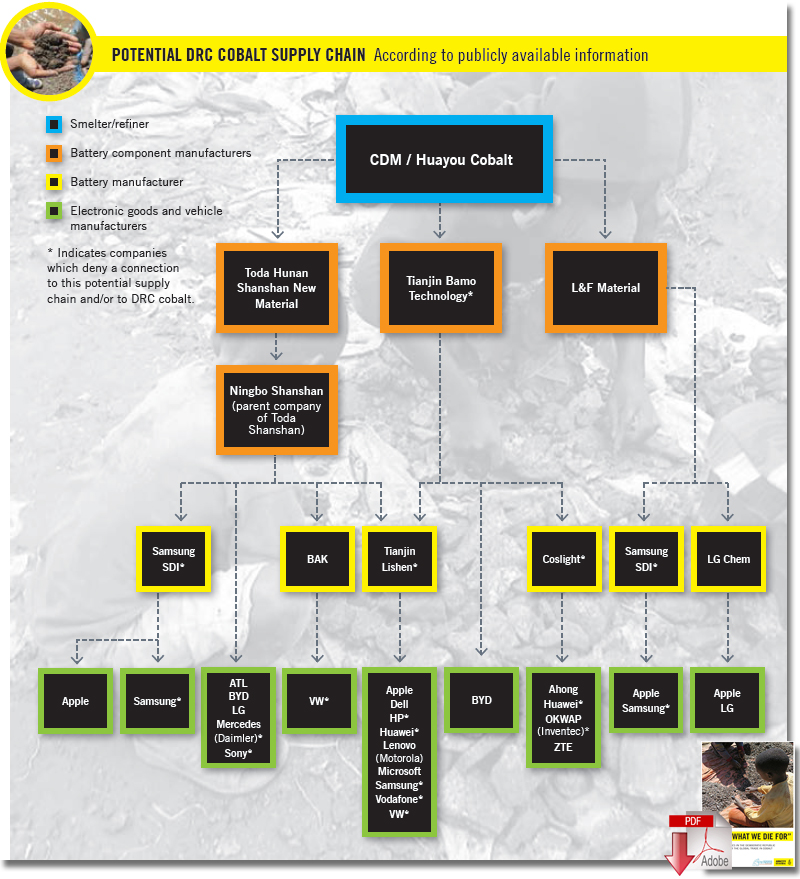A Big Supply Chain Issue - Cobalt Mining
Human rights watchdog Amnesty International has found a pretty big problem with the supply chains behind popular devices from Apple, Samsung, Sony, Microsoft, and other technology companies.
Amnesty International is calling on mobile phone giants, such as Apple, Samsung and Sony, to ensure minerals used in their products are not mined by children.
In a report released this week, Amnesty highlights the use of child labour in unauthorized cobalt mines in the Democratic Republic of Congo.
In the report, the organization connected these companies’ products with the mining of cobalt in the Democratic Republic of the Congo (DRC), where children, as well as adults, work without even basic equipment to protect them against frequent accidents and against the harmful effects of chronic exposure to cobalt.
Cobalt is a key component of the rechargeable lithium-ion batteries that power your smartphone, your tablet, your laptop, or even your electric car. The report was researched jointly by Amnesty International and the African Resources Watch (Afrewatch) and found that more than half of the world’s supply of cobalt comes from the DRC, where the government estimates that 20% of the cobalt currently exported comes from artisanal miners, who mine the metal using basic tools. Artisanal miners include children as young as seven, who scavenge for rocks that contain cobalt in the discarded byproducts of industrial mines.
The DRC is one of the poorest countries in the world, and many people began working in artisanal mining when the largest government-owned mining company collapsed in the 1990s. Most artisanal miners work in unauthorized or unregulated areas, or trespass on land controlled by industrial mining operations. In some areas, miners dig tunnels deep underground to access ore, often using only hand tools. In other areas, miners including children dig through rocks left over from industrial mining and refining processes.
In few circumstances are miners equipped with even basic protective equipment - like gloves, work clothes, or facemasks - to protect them against chronic exposure to cobalt, which can cause hard metal lung disease, respiratory sensitization, asthma, shortness of breath, decreased pulmonary function, and dermatitis. Accidents in unsupported hand-dug tunnels are frequent, and tens of thousands of children work up to 12 hours a day.
Children interviewed by researchers said that they had to work since their parents could not afford school fees, which range from about $10 to $30 per month. Some children don’t attend school and instead work full-time, while others attend school but work outside of school hours, on weekends, and during holidays. The report notes that “the involvement of children in mining constitutes one of the worst forms of child labour, which governments are required to prohibit and eliminate.”
But there are major “gaps and weaknesses” in the DRC’s regulation of artisanal mining, and traders buy minerals no matter where they come from or how they’ve been mined. Traders sell the ore to companies like Congo Dongfang Mining International (or CDM, a company owned by the Chinese mineral company Zhejiang Huayou Cobalt Company) who process and export it. Then Huayou Cobalt further smelts it, and sells the processed cobalt to battery component manufacturers in China and South Korea. These companies then sell to battery manufacturers, who sell to well-known brands including Apple, Dell, HP, Huawei, Lenovo, LG, Microsoft, Samsung, Sony, Vodfane, and vehicle makers like Daimler, Volkswagen and BYD.
The UN Guiding Principles on Business and Human Rights require companies to carry out human rights due diligence in order to “identify, prevent, mitigate and account for how they address their impacts on human rights.” But companies like CDM and Huayou Cobalt fail to identify where the cobalt they buy is extracted, handled, transported, and traded, or where it’s mined, by whom, and under what conditions. Which means that there’s a good chance that your gadgets from Apple, Samsung, and Microsoft use cobalt from artisanal mines, where both children and adults work in hazardous conditions. While some of the companies listed may not currently be customers of Huayou Cobalt, it’s unlikely that none of them source cobalt from the DRC.
Solving the problem is a complex issue. While companies like Apple and Microsoft have responded by saying that they don’t tolerate and are actively looking for human rights violations in their supply chains, many can’t determine whether the cobalt used in their batteries originates in artisanal mines in the DRC. Researchers suggest that the government of the DRC should further regulate mining, enforce labor and safety protections, enforce existing labor standards, and ensure that children can access free education. They also call on companies involved in the supply chain to disclose their due diligence practices and to take action when human rights abuses are exposed.
Tech companies have long struggled to keep conflict minerals out of their gadgets, with The New York Times reporting last year that minerals like tantalum, tungsten, tin, and gold are mined or extracted in impoverished areas across Africa, ones “long mired in civil war, violence, acts of rape and the use of child soldiers, appear in a variety of products.” It’s a challenging task for companies to ensure that their supply chains are conflict-free, even when they spend heavily on compliance services, as Apple, Microsoft, and Intel have done.
Until battery technology advances significantly, companies are going to struggle with sourcing cobalt ethically. Most lithium-ion batteries are cobalt-based, and one of the major advantages of such a formulation is high energy density. But anyone who relies on a smartphone throughout the work day would probably say that the battery life of their favorite gadgets could stand to improve. Because battery technology is notoriously slow to advance, it’s unlikely that tech companies are going to abandon the most effective battery formulation so far in order to distance themselves from rampant human rights abuses in the DRC.
Source: The Cheat Sheet













